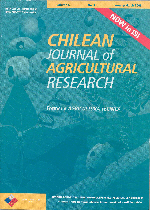
|
Agricultura Técnica
Instituto de Investigaciones Agropecuarias, INIA
ISSN: 0365-2807
EISSN: 0365-2807
Vol. 67, No. 3, 2007, pp. 253-261
|
 Bioline Code: at07031
Bioline Code: at07031
Full paper language: English
Document type: Research Article
Document available free of charge
|
|
|
Agricultura Técnica, Vol. 67, No. 3, 2007, pp. 253-261
| en |
Drought tolerance in recombinant chromosome substitution lines (RCSLs) derived from the cross Hordeum vulgare subsp. spontaneum  (Caesarea 26-24) x Hordeum. vulgare subsp. vulgare cv. Harrington (Caesarea 26-24) x Hordeum. vulgare subsp. vulgare cv. Harrington
Inostroza, Luis; del Pozo, Alejandro; Matus, Iván & Hayes, Patrick
Abstract
Grain yield (GY) and drought tolerance of recombinant chromosome substitution lines (RCSLs) derived from the cross between Hordeum vulgare L. subsp. spontaneum

(K. Koch) Thell. and H. vulgare L.subsp. vulgare cv. Harrington, were studied in two contrasting environments, one with water stress (WWS) and the other with no water stress (NWS), during three growing seasons, 2004-2005, 2005-2006 and 2006-2007. In the first season 80 RCSLs were sowed and in the following a selection of 13 RCSLs. An a-lattice design was used in all the experiments. With the data of GY obtained in sites WWS and NWS it was calculated the drought sensitivity index (DSI). During 2004-2005 growing season GY varied greatly among locations, reflecting differences in water availability. The average GY of the 80 RCSLs was 4.4 and 8.0 Mg ha-1 in sites WWS and NWS, respectively. The DSI varied between genotypes from 0.24 to 1.53. Furthermore, the DSI was negative and significantly correlated with the grain yield obtained in the WWS site and allowed to select a group of genotypes tolerant and other sensitive to drought. The group of drought tolerant genotypes yielded in WWS 18, 12 and 17% more than the sensitive ones, in 2004-2005, 2005-2006 and 2006-2007 seasons, respectively.
Keywords
barley, drought sensitivity index, grain yield water stress, genotype.
|
| |
| es |
Tolerancia a sequía en líneas recombinantes con sustitución de cromosomas (RCSLs) obtenidas de la cruza Hordeum vulgare subsp. spontaneum  (Caesarea 26-24) x Hordeum vulgare subsp. vulgare cv. Harrington (Caesarea 26-24) x Hordeum vulgare subsp. vulgare cv. Harrington
Inostroza, Luis; del Pozo, Alejandro; Matus, Iván & Hayes, Patrick
Resumen
Se estudió el rendimiento de grano (GY) y la tolerancia a la sequía de líneas recombinantes con substitución de cromosomas (RCSLs), provenientes de la cruza entre Hordeum vulgare L. subsp. spontaneum

(K. Koch) Thelly H. vulgare L.subsp. vulgare, en dos ambientes contrastantes, uno con estrés hídrico (WWS) y otro sin estrés hídrico (NWS), durante tres temporadas de crecimiento, 2004-2005, 2005-2006 y 2006-2007. En la primera temporada se establecieron 80 RCSLs y en las siguientes se evaluó una selección de 13 RCSLs. Se utilizó un diseño a-latice en todos los experimentos. Con los datos de GY obtenidos en los sitios WWS y NWS se calculó el índice de sensibilidad a la sequía (DSI). Durante la temporada 2004-2005, el GY varió ampliamente entre localidades, reflejando las diferencias en la disponibilidad de agua. El GY promedio de las 80 RCSLs fue 4,4 y 8,0 Mg ha-1 en los sitios WWS y NWS, respectivamente. El DSI varió ampliamente entre genotipos, desde 0,24 hasta 1,53. Además, el DSI se correlacionó negativa y significativamente con el rendimiento de grano en el ambiente WWS y permitió seleccionar un grupo de genotipos tolerantes y otro de sensibles a la sequía. El grupo de genotipos tolerantes a sequía mostró en el sitio WWS un rendimiento de grano promedio de 18, 12 y 7% superior al de los no tolerantes, en las temporadas 2004-2005, 2005-2006 y 2006-2007, respectivamente.
Palabras-clave
cebada,índice de sensibilidad a la sequía, rendimiento estrés hídrico, genotipos.
|
| |
© Copyright 2007 - Instituto de Investigaciones Agropecuarias, INIA (Chile).
Alternative site location: http://www.inia.cl/at/agritec.htm
|
|
